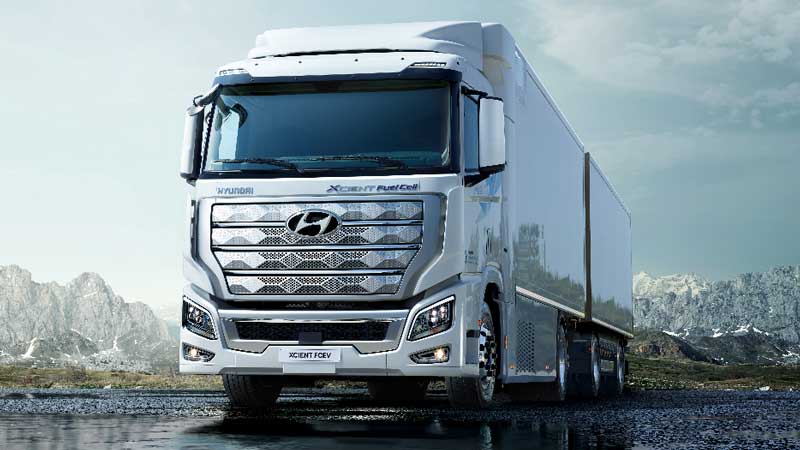Hyundai Motor Company has shipped the first 10 units of its new Hyundai Xcient hydrogen-powered trucks to Switzerland, the world’s first mass-produced fuel cell heavy-duty truck.
The South Korean automotive giant announced that it would ship a total of 50 of its Xcient Fuel Cell trucks to Switzerland this year, with handover to commercial fleet customers expected to start in September.
Hyundai is planning to roll out a total of 1,600 Xcient Fuell Cell trucks by 2025, reflecting what the company describes as its “environmental commitment and technological prowess as it works toward reducing carbon emissions through zero-emission solutions.”
“Xcient Fuel Cell is a present-day reality, not as a mere future drawing board project,” said In Cheol Lee, Executive Vice President and Head of Commercial Vehicle Division at Hyundai Motor.
“By putting this groundbreaking vehicle on the road now, Hyundai marks a significant milestone in the history of commercial vehicles and the development of hydrogen society.
“Building a comprehensive hydrogen ecosystem, where critical transportation needs are met by vehicles like Xcient Fuel Cell, will lead to a paradigm shift that removes automobile emissions from the environmental equation.”
“Having introduced the world’s first mass-produced fuel-cell electric passenger vehicle, the ix35, and the second-generation fuel cell electric vehicle, the Nexo, Hyundai is now leveraging decades of experience, world-leading fuel-cell technology, and mass-production capability to advance hydrogen in the commercial vehicle sector with the Xcient Fuel Cell.”
The Xcient is powered by a 190kW hydrogen fuel cell system with dual 95kW fuel cell stacks, while seven large hydrogen tanks offer a combined storage capacity of approximately 32.09 kilograms worth of hydrogen.
The Xcient boasts a driving range per charge of around 400 kilometres, which according to Hyundai “was developed with an optimal balance between the specific requirements from the potential commercial fleet customers and the charging infrastructure in Switzerland.” Refuelling for each Xcient truck takes between 8 to 20 minutes.
Hyundai Motor Company believes that fuel cell technology is “particularly well-suited to commercial shipping and logistics due to long ranges and short refuelling times” and claims that the dual-mounted fuel cell system provides the truck with enough energy to drive up and down Switzerland’s mountainous terrain.
The delivery marks the first step in Hyundai Motor Company’s larger hydrogen strategy. Hyundai Motor Company formed Hyundai Hydrogen Mobility (HHM) back in 2019, a joint venture with Swiss company H2 Energy, which will lease the trucks to commercial truck operators on a pay-per-use basis, meaning that commercial fleet customers will not need to drop large sums of cash on an initial investment.
Hyundai’s move to begin its hydrogen strategy in Switzerland was based in a variety of reasons – including the Swiss LSVA road tax on commercial vehicles, which does not apply for zero-emission trucks – all of which made the central European country a natural starting place.
According to Hyundai, the lack of tax on the Xcient Fuel Cell truck “nearly equalizes the hauling costs per kilometre of the fuel cell truck compared to a regular diesel truck.”
Another aspect of Hyundai’s decision to start its focus on hydrogen in Switzerland was the country’s huge share of electricity generated by hydropower. According to Hyundai, “To truly reduce carbon emissions, all of the trucks need to run on only green hydrogen,” and the company has built its business case around this concept. With so much hydropower on offer, Switzerland can deliver enough green electricity to produce the necessary hydrogen.
Once the project is underway in Switzerland, Hyundai plan to expand it to other parts of Europe as well.
Hyundai also has other hydrogen vehicles on its mind, including a long-distance tractor unit capable of traveling 1,000 kilometres on a single charge which will be equipped with an enhanced fuel cell system with high durability and power.
In addition, the Hyundai Nexo is a second-generation hydrogen-powered SUV, and by 2025 the company is aiming to sell 670,000 electric vehicles each year – including 110,000 FCEVs.
Joshua S. Hill is a Melbourne-based journalist who has been writing about climate change, clean technology, and electric vehicles for over 15 years. He has been reporting on electric vehicles and clean technologies for Renew Economy and The Driven since 2012. His preferred mode of transport is his feet.


